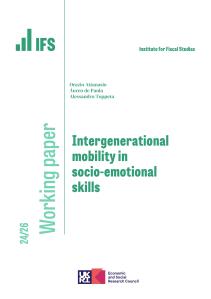Access
Early childhood development is becoming the focus of policy worldwide. However, the evidence on the effectiveness of scalable models is scant, particularly when it comes to infants in developing countries. In this paper, we describe and evaluate with a cluster-Randomized Controlled Trial an intervention designed to improve the quality of child stimulation within the context of an existing parenting program in Colombia, known as FAMI. The intervention improved children’s development by 0.16 of a standard deviation (SD) and children’s nutritional status, as reflected in a reduction of 5.8 percentage points of children whose height-for-age is below -1 SD.
Authors

Research Fellow
Orazio is an International Research Fellow at the IFS, a Professor at Yale and a Research Associate at the National Bureau of Economic Research.

Universidad de los Andes

Research Fellow Yale University
Costas is a Research Fellow of the IFS and a Professor of Economics at Yale University and a Visiting Professor at University College London.

Research Associate
Marta is a Research Associate, working at the Centre for Evaluation of Development Policies at IFS and at the Inter-American Development.
Fundacion Exitohttps://www.fundacionexito.org/equipo-de-trabajo/area-de-inversion-social-y/diana-pineda
Bangor University
Journal article details
- DOI
- 10.1093/jeea/jvac005
- Publisher
- Oxford University Press
- ISSN
- 1542-4766
- Issue
- Volume 20, Issue 4, January 2022, pages 1395-1432
Suggested citation
Attanasio, O et al. (2022). 'Early stimulation and nutrition: The impacts of a scalable intervention' 20(4/2022), pp.1395–1432.
More from IFS
Understand this issue

Sure Start achieved its aims, then we threw it away
15 April 2024

What is the two-child limit in benefits?
27 June 2024

A mess has been made of Child Benefit, and the clear-up operation may not be easy
29 March 2024
Policy analysis

Free breakfast clubs in schools: what Labour’s plans would mean for pupils and families
25 June 2024

Labour’s plans to build childcare spaces in schools will nudge the market in a different direction – but not transform it
9 June 2024

Conservatives' plan for child benefit withdrawal goes some way to fixing a bizarre system - but misses an opportunity for a more fundamental reshape
6 June 2024
Academic research

Forced displacement, mental health, and child development: Evidence from Rohingya refugees
10 May 2024

Economics of Childhood Nutrition Workshop

Intergenerational mobility in socio-emotional skills
5 June 2024